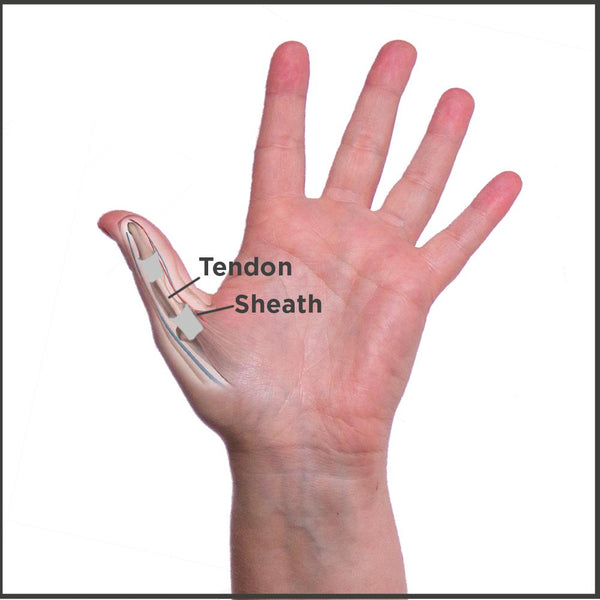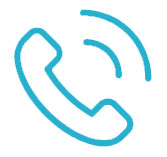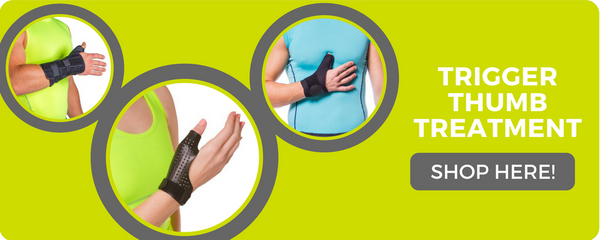Trigger Thumb
What is Trigger Thumb?
As you’ve just heard in the video, trigger thumb is a common and debilitating condition. The tendons in your thumb and fingers are covered in a tunnel-like structure of tissues that are called sheaths. If you have trigger thumb, your tendons have become inflamed. Because of this inflammation or swelling, your tendons are no longer properly gliding through your sheaths. When this happens, the base of your fingers may lock up, click, or pop. Essentially, your fingers get stuck in a non-relaxed position. This has the potential to be a very painful and frustrating condition, as you lose the full function of your thumbs. This condition can happen to all of your fingers including your thumbs, index, middle, ring, and pinky.
To better understand what’s happening if you have trigger thumb check out the graphic of your thumbs anatomy below:

FUN FACT: Trigger Finger Thumb is Also Called Stenosing Tenosynovitis
Don’t freak out if your doctor told you have stenosing tenosynovitis but you thought you had trigger thumb. Stenosing tenosynovitis and trigger thumb or finger are the exact same condition. Stenosing tenosynovitis is the medical term for trigger thumb and is often used in the medical world.
How do I know if the Pain at the Base of my Thumb is from Trigger Thumb?
People often describe the pain they are experiencing in their thumbs as:
-
Having a sore thumb
-
Pain at the base of the thumb joint
-
Thumb knuckle pain
-
Thumb tendon pain
-
Thumb locking pain
However, there are conditions outside of trigger thumb that may occur to your thumb joint and be described in a similar way. To help you decipher which thumb condition you have read the most likely problems and their most common symptoms:
- Osteoarthritis - Osteoarthritis is the form of arthritis that most commonly affects the thumb or basal joint. Osteoarthritis occurs when the cartilage of your thumb begins to wear away. Pain due to osteoarthritis of the thumb is most often described as a swelling of the joint and discomfort when using the thumb.
- Carpal Tunnel Syndrome - Your carpal tunnel is the narrow passageway on the palm side of your wrists. The median nerve runs through this passageway along with tendons to the fingers and thumbs. When this is pinched or compressed you have carpal tunnel syndrome. The most common symptoms are described as numbness, soreness, tingling, and all around pain in the hand.
- Ganglion Cysts - Ganglion cysts are very common lumps that occur in a person’s hand or wrist. The cause for the cyst is usually unknown. However, they may be forming because of joint irritation or mechanical changes. The most common symptom is the obvious formation of a nodule in the hand area adjacent to joints or tendons. The cysts resemble a water balloon and are filled with a clear fluid or gel.
What Are the Most Common Symptoms of Trigger Thumb? Is It Just Pain In the Thumb Joint?
Trigger thumb has the potential to have a variety of symptoms, although heavy thumb pain at the base of your joint and your thumb locking in the bent position are the most common. Other symptoms include finger stiffness that occurs in the morning, a popping or clicking sensation when you attempt to move your fingers, and a bump or nodule at the base of your palm.
-
Thumb pain at the base of your joint
-
Thumb joint locks up or gets stuck in a bent position
-
Finger stiffness most commonly in the morning
-
Popping or clicking sensation when you attempt to move your thumb
-
Bump or nodule at the base of your palm
What Are the Causes of Trigger Finger Thumb?
Unfortunately, trigger thumb is one of those conditions where there isn’t a clear definitive cause. However, there are some clear cases in which your chances of getting trigger finger or thumb are increased. Read them below to see if any of these may have to do with your trigger thumb:
-
Working an occupation where repeated gripping is necessary
-
People who have diabetes show an increased chance of developing trigger thumb and finger
-
People who have rheumatoid arthritis tend to have higher chances of trigger thumb because of the inflammation that occurs from arthritis. If you have rheumatoid arthritis your chances greatly increase because of your susceptibility to swelling.
-
There is a thing called the “triad” of conditions in which 3 conditions often seen together. With trigger thumb, it generally comes along with Dupuytren's contracture and carpal tunnel.
Can Trigger Thumb Occur in any of my Fingers?
Yes! Trigger thumb can occur in any of your fingers and in more than one at a time. It is most common in the thumb. That’s why we call trigger thumb and trigger finger two different things. However, there is no difference other than the name. It also commonly occurs in the ring and middle finger but can be seen in any.
What are my Treatment Options For Trigger Thumb?
Although you may be experiencing a ton of pain from your trigger thumb... There is light at the end of the tunnel. Thankfully, trigger thumb is highly treatable with both conservative and surgical methods and remedies.
Brace for Trigger Thumb - Locked thumb, stiff thumb, etc.
Bracing for your sore thumb joint is a great way to help fix your trigger thumb. If you are looking to immobilize your finger for pain relief this brace is a great option. This solution is great because it’s an easy at home remedy. If your thumb is stiff or swollen in the morning a brace like this should instantly help to alleviate your pain. Also, if you are someone who experiences trigger thumb symptoms by the locking of your fingers a brace will completely prevent this from occurring.
Trigger Thumb Exercise
Trigger thumb exercises are the best way to get your digits back to optimal functioning. They will help to work out and stretch your tendons in order to relieve your pain. Exercises are also a great option because they strengthen your tendons to prevent the issue from ever reoccurring, or starting in a different finger. Check out this blog to see a few examples of our favorite trigger thumb exercises.
Trigger Thumb Physical Therapy
Physical therapy is another great treatment option for trigger thumb because it helps fix the problem of mobility. Physical therapists use a variety of different techniques to help with your trigger thumb depending on who you see. A therapist will work with you on stretches, exercises, and other treatment techniques.
Trigger Thumb Surgery
Before you consider surgery, try some of the conservative treatment options, because it’s estimated that 85% of trigger thumb cases can be cured without surgery. However, for those severe cases, trigger thumb surgery is a fantastic option with almost 100% of people cured. The likely first step will be a round or two of steroid injections from your doctor. If the steroid injections do not solve your problem there are two likely surgical options:
-
Open Surgery for Trigger Thumb or Finger Pain
-
Percutaneous Release Surgery for Trigger Thumb or Finger Pain
-
Read more about these two release surgeries for trigger thumb or finger.
Can I Return to Work Right After my Trigger Thumb Surgery?
Post surgery recovery time varies depending on the person but is generally pretty quick! If you undergo open surgery it may take up to 6 weeks to have full unrestricted motion back. While the percutaneous release surgery will have a much faster recovery time. When it comes to going back to work it depends on the nature of your job. If you are involved in manual labor it may be up to 3 weeks before you are ready to work again. Jobs with little labor may not require anytime off.
Congenital Trigger Thumb in Children
The situation in pediatric cases is different. As in the case of adults, the primary trigger thumb symptoms are the catching or locking sensation. But in children, the explanation for congenital trigger thumb is that the sheath is developing too narrow for the tendon to glide easily through. Congenital, meaning present at birth, means babies were born with trigger thumb. Although, some doctors disagree with the notion that children are born with the medical condition. The condition appears to be the most common in between the ages of 1 and 3. Because of this, it is also commonly called “pediatric trigger thumb”. Infants who appear to be born with trigger thumb also seem to have the condition clear up on its own. Treatment for trigger thumb in kids and toddlers who condition doesn’t clear up varies. Surgery is not entirely uncommon as well as an attempt at bracing and exercises. For more information on trigger thumb in children read here.
Can I Prevent Trigger Thumb From Occurring?
If you fall into any of the conditions listed above and are concerned you may develop trigger thumb there are precautions you can take. Of course, avoiding overusing your fingers and thumbs is the main form of prevention. However, the exercises listed above are great because they will assist in the strengthening of your thumbs tendons. The stronger your tendons the less likely you will develop the condition.











